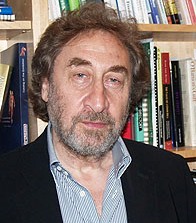A recent science_museum tweet reads:
“Israeli Day of Science at the museum today. Protestor’s outside. Come down for politics and potential terror, but not the IMAX as it’s shut.”
Also this letter in the Independent from leading scientists and academics:
Dear Sir,
We were saddened by attempts to cancel the “Israel Science Day” lectures and workshops for schoolchildren. Whatever our opinions on the actions of the Israeli Government, scientists and academics should not be punished simply for their nationality.
Science crosses borders, builds bridges and transcends national and political divides. It can unite people, but the protesters seek only to divide and exclude. At a time of high community tensions, these boycott calls are especially pernicious.
The group of protesters peddled a discredited academic boycott inside the University and College Union, which was widely condemned as discriminatory and was abandoned. After failing in their union, they have continued the boycott campaign in wider society, trying to prevent British schoolchildren from being inspired by scientific discovery and innovation.
We welcome the Science Museum’s principled position in refusing to cancel this event, and hope that the “Israel Science Day” events inspire British pupils to pursue a future of their own scientific innovations and successes.
Signed:
Baroness Greenfield Director, the Royal Institution
Lord May FRS President Elect, British Association for the Advancement of Science; previous President, Royal Society; former Chief Scientific Adviser to HM Government,
Lord Haskel Member, Lords Committee on Science and Technology
Lord Winston
Baroness Deech former chair, Human Fertilisation & Embryology Authority
Dr Stephen Ladyman MP a professional scientist before becoming an MP
Tim Boswell MP Member, Innovation Universities and Skills Committee
Professor Denis Noble CBE FRS University of Oxford
Professor Sir Walter Bodmer University of Oxford
Professor Sir Peter Lachmann FRS FMedSci founder President, the UK Academy of Medical Sciences; past president, Royal College of Pathologists
Lord Turnberg
Professor Raymond Dwek FRS University of Oxford
Professor Jeremy K. M. Sanders FRS University College London
Professor Sir Alan Fersht FRS University of Cambridge
Professor Felix Weinberg FRS Imperial College London
Professor Stephen Neidle University of London
Professor Sarah Annes Brown Anglia Ruskin University
Professor NH Freeman University of Bristol
Professor Shalom Lappin Kings College, London
Professor Ludwik Finkelstein OBE FREng City University
Professor Yan V Fyodorov University of Nottingham
Professor Richard Bell University of Nottingham
Professor Michael Yudkin University of Oxford
Sir Ian Gainsford King’s College London (retd)
Professor Norman Fenton Queen Mary, University of London
Professor J M Reese University of Strathclyde
Professor Naomi A Fineberg University of Hertfordshire
Professor Ashley Grossman FRCP FMedSci London School of Medicine
Professor Geoffrey Alderman University of Buckingham
Professor Peter Maitlis Sheffield University
Professor David R Katz University College London
Professor Anthony Warrens FHEA FRCP Imperial College, London
Professor Ruth Itzhaki University of Manchester
Professor Alan Zinober University of Sheffield
Professor John Friend University of Hull (retd)
Professor Matthew H. Kramer University of Cambridge
Professor Yehuda Baruch University of East Anglia
Professor Gregory Gutin Royal Holloway, University of Londojn
Professor Daniel Hochhauser University College London
Professor David Stone University of Glasgow
Professor Irving Taylor ChM FRCS FMedSci FHEA University College London
Professor Mervyn Singer FRCP University College London
Professor A. David Smith University of Oxford
Professor Bernard S. Jackson University of Manchester
Professor Mark Schankerman London School of Economics
Professor Naomi Chayen Imperial College London
Professor Efraim Karsh King’s College London
Professor Keith Willison Institute of Cancer Research
Professor Brian L Burrows Staffordshire University
Professor Dame Hazel Genn University College London
Professor Stanley Bleehen University of Sheffield
Professor D. H. Foster University of Manchester
Professor Adrian Hyde-Price University of Bath
Professor Michael Sternberg
Professor Bryan Reuben London South Bank University
Professor Clive Jones University of Leeds
Professor Simon Wesseley Institute of Psychiatry
Dr Patrick Carmichael University of Cambridge
Dr Bernard S. Kay University of York
Dr Raya Khanin University of Glasgow
Dr Eugene Avrutin University of York
Michael Krom University of Leeds
Leslie Reinhorn University of Durham
Dr Eldad Avital Queen Mary, University of London
Dr Michael Kandiah University of London
Dr Margaret Myers retd
Dr Teresa Tiffert University of Cambridge
Dr Virgilio Lew University of Cambridge
Dr N.E.Scott-Samuel University of Bristol
Sophie Garside University of Manchester
Dr SM Lewis Imperial College, London
Dr Yuri Bazlov University of Warwick
Dr Anna Zecharia Imperial College, London
Rob Stevens Sheffield Hallam University
Dr Howard Kahn Heriot Watt University
Derek Meyer St Georges, University of London
I.Lewis Chemist, English Electrical Company (retd.)
Dr Nina Collins University of Leeds
Dr Jeffrey Ketland University of Edinburgh
Dr Ray Noble University College London
Dr Shoshana Squires University of Cambridge
Dr Jennifer Mindell University College London
Dr Liz Lightstone FRCP Imperial College London
Louis Lyons Imperial College London
Mark Katz CEO, Mark-IT
Brian Kerner MRPharmS (retd)
Barry Landy University of Cambridge (retd)
Dr Jose Liht University of Cambridge
Dr Ariel Hessayon FRHistS Goldsmiths, University of London
Yael Benn student, University of Sheffield
Julian Love University of Derby
Dr Elijah R Behr St George’s University of London
Maria Toledo University of Nottingham
Dr Sygal Amitay Queen’s Medical Centre, Nottingham
Dr Norman Solomon University of Oxford
Dr Sharon Morein University of Cambridge
Dr Hillary B. Katz London South Bank University
Dr Alan Benster
Peter Fine University of Sussex
Dr Michael Bardill
Marta Carroni PhD Student, Imperial College London
Dr Jonathan Rosier University College London
Dr Federico Carafoli Imperial College, London
John Akins Imperial College, London
Also in The Independent, a piece about Israeli science and the difference it makes:
“International co-operation in science is near-universal because scientific research recognises few borders. Indeed, there have been attempts to forge more direct links between Israeli scientists and their Palestinian colleagues. An umbrella organisation called the Israeli- Palestinian Scientific Organisation was established in 2002 to distribute grants worth about £50,000 for joint research projects.
One British scientist who has close links with Israel said that many of his Israeli friends and colleagues strongly disapprove of the recent actions in Gaza. But his view is that it is counter-productive to call for a boycott of Israeli science and scientists: isolating the most liberal-minded Israelis would only make matters worse.”]#
UPDATE (DH)
See also yesterday’s Times editorial



